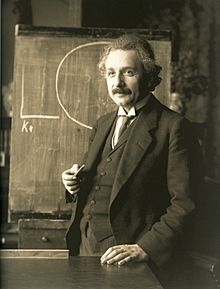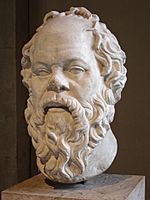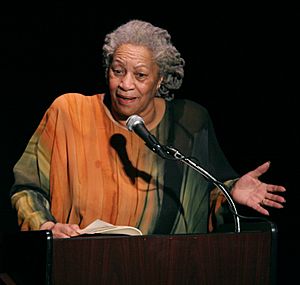Professor facts for kids

Albert Einstein as a professor
|
|
| Occupation | |
|---|---|
| Names | Professor |
|
Occupation type
|
Education, research, teaching |
|
Activity sectors
|
Academics |
| Description | |
| Competencies | Academic knowledge, research, writing journal articles or book chapters, teaching |
|
Education required
|
Master's degree, doctoral degree (e.g., Ph.D.), professional degree, or other terminal degree |
|
Fields of
employment |
Academics |
|
Related jobs
|
Teacher, lecturer, reader, researcher |
A professor (often shortened to Prof.) is a top academic position at universities and other places where people learn and do research. The word professor comes from Latin. It means "someone who declares" or "someone who is an expert." Professors are usually experts in their field, like science or art, and they are teachers of the highest rank.
In many parts of the world, "professor" means the most senior academic job. This person is sometimes called a "full professor." However, in countries like the United States, the word "professor" can also be used for lower ranks, such as associate professor or assistant professor. Sometimes, people even use the word "professor" to refer to any university teacher. But in most academic groups, only the most senior teachers are truly called "Professor" (with a capital P).
Professors often do original research to discover new things. They also teach classes to students at different levels, from those just starting university to those studying for advanced degrees. At universities with graduate schools, professors guide students who are working on their theses (big research projects). Many "full professors" also take on important leadership roles. They might lead departments, research teams, or even become the president of a university. Professors are often seen as national or international leaders in their area of expertise.
What Does "Professor" Mean?

The word "professor" first appeared in the late 1300s. It meant "someone who teaches a branch of knowledge." It comes from the Latin word professor, which meant "a person who claims to be an expert in some art or science; a teacher of the highest rank." The short form, "prof," started being used around 1838.
Who Are Professors?
A professor is a highly skilled and recognized academic. In many Commonwealth countries and northern Europe, "professor" is the highest teaching rank at a university. In the United States and Canada, many post-doctoral academics are called "professor." This means a larger number of teachers hold this title there.
In these areas, professors are scholars who usually have a Ph.D. (a high-level degree) or similar qualifications. They teach at four-year colleges and universities.
An emeritus professor is a special title given to some retired professors. Universities give them this title because they want to stay connected to these important scholars and their ongoing research. Emeritus professors don't get a salary, but they often get office space, lab access, and library use.
The term "professor" is also used in titles like assistant professor and associate professor. However, in some European countries, these are not considered full professor positions. In Australia, associate professor is used instead of reader, which is a title used in the United Kingdom. An associate professor ranks above a senior lecturer but below a full professor.
Sometimes, universities give the title honorary professor to famous artists, athletes, or foreign leaders. They get this title even if they don't have the usual academic degrees or do regular teaching duties. These "honorary professors" usually don't do academic work for the university. Generally, the title of professor is strictly used for people who hold academic jobs, not just for honorary reasons.
What Do Professors Do?
Professors are experts in their fields. They usually perform some or all of these important tasks:
- Leading teaching, research, and publications in their departments (in countries where a professor is the head).
- Giving lectures and seminars about their special subjects. This is where they "profess" their knowledge.
- Doing and leading advanced original research. They then publish their findings in peer reviewed journals.
- Helping the community for free. This can include advising governments or non-profit groups. They might also share their expert opinions on TV or radio news.
- Guiding graduate students as they learn and do their own research.
- Mentoring younger academic staff members.
- Handling administrative or management jobs, often at a high level. For example, they might be deans or heads of departments.
- Grading student examinations or listening to viva voce defenses (oral exams).
The exact tasks of a professor can change depending on the university, its history, and where it is located. For example, professors at research-focused universities in North America and Europe are often promoted mainly because of their research achievements and success in getting grants for their work.
Images for kids
-
Professor Moriarty from the Sherlock Holmes story "The Final Problem"
See also
 In Spanish: Catedrático de universidad para niños
In Spanish: Catedrático de universidad para niños



